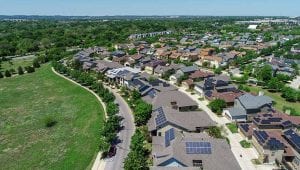One of the first things worth noting about Samuel Yang – president and CEO of China’s Hareon Solar – is that his academic major was in economics. Not in science or technology or engineering, but economics.
Because it is the rapidly shifting economics of the global solar market that has so confounded so many companies, including industry giants like Suntech – which Yang, an Australian citizen, helped to co-found in 1999 out of Macquarie University in NSW. And it is the current economics of solar energy that so interests Yang.
In past years, he says, solar has been a seller’s market, “and when you have a seller’s market, anybody can do that – it’s easy.” But when it turns immediately to a buyer’s market, which is what has happened in the solar market in the wake of the global financial crisis, “you have to ask, are you ready to compete?”
But it is not only the industry that seems to be missing the big economic picture of solar. “I always urge governments, don’t ignore this,” Yang said, speaking to RenewEconomy on the sidelines of the Solar 2013 Conference and Expo in Melbourne this week. “This is not an ordinary commercial business, with ordinary commercial benefits,” he says. “This is our huge responsibility, to protect the environment. I don’t encourage any government to ignore this.”
In Australia, he adds, “I realise that there is some sort of interest conflict with the current electricity suppliers. But I think this is our mission, our responsibility, to use renewable energy. This is not about individual companies’ commercial interest.”
He cites the example of Germany, whose government mounted its renewable energy campaign 10 years ago, pushing solar in particular. Since then, solar has managed, at certain points in 2012, to supply almost 50% of Germany’s power supply.
“This was a very wise policy,” Yang says. “The German government changed the structure of the energy grid.” And it did this, he points out, at a time when solar PV module prices were high, at over $4.
Now, says Yang, the module price is under 90c – “So why do we not do it? We should have that sort of vision as a government,” he says, especially with Australia’s far superior solar resource. “Why don’t we do it? It is a shame.”
As the founder or co-founder of companies including Suntech, Sunergy and JA Solar, Yang also has a particular insight into the Chinese solar industry – an industry that has been responsible for 70 per cent of the world’s solar product, but which itself has a meagre 1 per cent of its electricity supply coming from solar.
Yang says he believes this disparity will be redressed very fast, though, and that China could have as much as 50GW of solar capacity within just a few years. This growth, he says, will come mainly from residential rooftop solar PV – particularly in China’s more developed cities, like Beijing, where it costs $1 million-plus to buy an apartment.
“While the apartment price is so high… why do Chinese people still pay the ordinary electricity charge? It is not reasonable. I think people will realise that.”
Yang says he believes the Chinese government is also on the verge of issuing more policies to support solar, particularly in the potentially lucrative commercial and industrial sectors.
Companies like Hareon also see the “huge” potential demand in developing countries like Indonesia and India, where current energy supplies do not meet demand. “But we don’t know how to solve the financial problems there,” Yang says. “The people cannot afford (to pay for solar), and the government can’t afford to subsidise it, so that is our dilemma.”
The challenge, now, for solar companies, Yang said in his keynote address to the conference on Thursday morning, is to work out how to lower costs and raise the quality of the technology, while also reducing the industry’s reliance on government subsidies.
And most importantly of all, he says, solar manufacturers must offer a 25-year warranty on their product. Solar panels “must work for 25 years,” Yang said, “otherwise it is not a renewable product at all.”
As for the technology to watch, it’s energy storage which Yang finds really exciting. “I believe that energy storage technology, like any other technology… will have a breakthrough – I am curiously expecting that,” Yang told RenewEconomy.
Once this breakthrough happens, he says, “that would really be a total revolution of this energy. That means every family can have their own independent power supply,” an outcome Yang believes would be “particularly fortunate for countries like Australia.”
Not so much for the aforementioned power companies, though.










